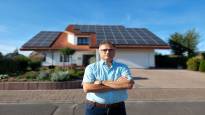EICHENZELL, HESSEN. The real downfall started with the corona pandemic.
Even before that, Germany had experienced the historic immigration years of 2015 and 2016, when about one million immigrants came to the country as a result of the wars in Syria and Afghanistan.
Greece had been supported during the euro crisis largely with German funds. Finally, the chancellor of the Christian Democratic CDU party Angela Merkel succumbed to the collective debt of the EU countries.
In Brussels, the new EU Commission elected a German Christian Democrat Ursula von der Leyen led by the main task of the fight against climate change.
All this was still within acceptable limits For Helmut Seifert, who had always voted for the CDU. It was not okay, on the other hand, that people were advised to close themselves in their homes and were obliged to be widely vaccinated because of the corona virus.
The graduate engineer who had just retired concluded that “something was now going badly wrong and fast”.
Seifert wrote his first public section articles in 2020. They dealt with the treatment of the pandemic and the economy: “restrictive measures do not make sense, people are being cheated”.
Even in the 2021 Bundestag election, Seifert voted for the CDU, even though Merkel made his party too green-left. In Seifert’s opinion, Germany has only made mistake after mistake since Corona.
“Germany is no longer what it used to be”
Then came the decisive moment. The EU imposed sanctions on Russia because of the war of aggression. It caused Russia to cut off gas supplies to Germany.
According to Seifert, Russia’s punitive measures were a mistake. They resulted in an economic and political crisis in Germany. The industry suffered from high gas prices, taxpayers were called for help, it was feared that the electricity would run out in the winter.
– What Germany used to be, it is no longer. Germany was so economically strong that it could wag its finger at others: we are right, you are wrong, Seifert explains.
German companies now pay more for their energy than their competitors in the world. Deindustrialization, i.e. the flight of industry from the country, became a big topic of conversation last fall.
In Seifert’s opinion, the opposition party CDU should have intervened more vigorously in all of this. The CDU was wrong. Seifert decided to start supporting the Alternative für Deutschland (Alternative für Deutschland) party, or AfD.
AfD was founded in 2013 by economics professors who opposed the euro. Since then, it has become a strongly anti-immigration party.
Now the AfD blames the old parties for all bad developments in Germany.
Its support has doubled within just one year. In the East German states, AfD is supported by 30 percent of voters. It is also the second largest party in Bavaria and Hesse after the CSU/CDU.
AfD is most typically voted by people living outside of big cities, over 50, and men more often than women.
Helmut and by Gerlinde Seifert roses, hydrangeas and bellflowers bloom in the yard. The fountain is bubbling. The yard, carefully arranged on three levels, is the largest in the prosperous block of private houses.
Gerlinde Seifert serves pasta sauce made from tomatoes from her own garden. She doesn’t want to comment on politics, but says she now votes for AfD, like her husband.
AfD’s rise to power is prevented by the fact that the old parties do not agree to cooperate with it. Recently, especially the CDU’s withdrawal from cooperation has annoyed the supporters of the AfD.
This only strengthens AfD’s support, according to Helmut Seifert. Due to isolation, the party has become a martyr in the eyes of some. In Germany, we talk about a firewall when we mean a refusal to cooperate with the AfD.
– The firewall is absurd, it only divides people. They don’t even want to talk to the AfD. At the same time, the whole society is divided when it is said that everyone who votes for the AfD is a Nazi or an extreme rightist, says Seifert.
Seifert follows the economy closely because he is a former entrepreneur. He has had three construction companies. Sometimes it went really well, sometimes especially the investments in East Germany went to waste.
– If the AfD were to get into the government, I would expect it to change the energy policy first. I also look forward to fixing the German economy by improving infrastructure and digitization and fixing schools.
In Seifert’s opinion, the energy policy needs to be changed so that we start trading with Russia again. AfD members generally agree.
Seifert is preparing to give a presentation on “climate hysteria”. He will soon speak at a rural hotel in Bavaria to support the local AfD. He got the invitation because of his writings in the public section.
He projects statistical images on the wall of his home with a slide projector, according to which climate change is a natural development in world history.
Seifert has invited his friend, a business management consultant, as the training audience by Stefan Krenzer. Krenzer thinks about politics in the same way as Seifert.
The solar panels on the roof of Seifert’s house produce more electricity than the family needs. Still, he thinks the energy saving measures for houses planned by the German government are ridiculous.
– They only cause more housing costs for people, which will rise anyway.
Germany intends to compensate the expenses for households, but in Seifert’s opinion, then taxpayers’ money will be wasted.
AfD is now gathering votes above all with its criticism of immigration. Seifert expects the party to “protect the borders again” so that “illegal” asylum seekers will no longer come.
– I also expect that such immigrants who have nothing to do in Germany will be returned to their home countries.
In practice, it would mean that everyone who is not in Germany for humanitarian reasons or at work would receive departure passports.
